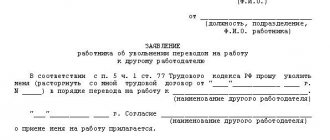Terms of transfer
Today, the labor legislation of the Russian Federation provides for four main conditions that allow the employer to transfer an employee:
- transfer of an employee to another place is possible if it is determined by the presence of a medical certificate;
- the medical report is recognized as legitimate and has legal force, since it was issued in strict accordance with the norms of labor law in force in the Russian Federation;
- the employer can provide the employee with work that he can perform without harm to his health;
- the employee signed an agreement to transfer to another workplace.
Similar conditions were derived in law enforcement practice on the basis of Article 73 of the Labor Code of the Russian Federation. It should be noted that the procedure for issuing a medical report is prescribed in numerous regulations, but Federal Law No. 52-FZ “On the sanitary and epidemiological welfare of the population” is recognized as one of the main ones.
For example, this law stipulates that persons who are carriers of pathogens of infectious diseases are recognized as the source of such diseases, therefore, with their written consent, they can be temporarily transferred to another job that does not harm health and does not contribute to the spread of infection.
Employee refusal to transfer
Permanent or temporary transfer of an employee to another place of work is determined by Art. 72 Labor Code of the Russian Federation. This rule of law provides clear regulations on how such a procedure should take place. In particular, the Labor Code of the Russian Federation states that the employer must obtain written consent from the employee regarding the transfer.
But what if the employee refuses the transfer? In this case, Art. 73 of the Labor Code of the Russian Federation, which states that the employer in his actions must be based on the medical report and the period indicated in it for which the employee’s transfer is required:
- if the conclusion states that the employee must be transferred for medical reasons to another job for a period of up to 4 months, then the employer is obliged to retain the subject of the labor relationship at his previous place of work. In other words, the employment contract is maintained for the entire period of the employee’s temporary absence from his workplace. In this case, the employee is suspended from work for the entire period specified in the conclusion, and also loses his financial earnings. This principle is fixed in paragraph 2 of Art. 73 Labor Code of the Russian Federation.
- If, according to the conclusion, the employee requires a transfer for medical reasons for a period of more than 4 months, but the transfer is refused (or if there is no vacant position), then the employer has legal grounds for terminating the employment contract, that is, dismissing the employee. In this situation, Art. 77 Labor Code of the Russian Federation.
It should be noted that when transferring an employee or dismissing a person due to his refusal or lack of position, legislative regulations must be taken into account, which allows the interests and rights of the subject of labor relations to be respected. If the procedure is violated, the employee can appeal to the court, which will recognize the dismissal order as void, that is, invalid.
Regulatory documents regulating transfer to another job for medical reasons
| Name of the normative legal act | Document Number | Description |
| Labor Code | Article No. 72 | The article regulates the mandatory agreement of both parties to the employment contract on the transfer of an employee to another place of work |
| Article No. 73 | The article regulates the main provisions related to the transfer of an employee to another job for medical reasons | |
| Article No. 77 | This article regulates the general grounds for dismissing an employee from his position, including for medical reasons if the employee refuses to transfer to another job. | |
| Article No. 182 | The article explains what legal guarantees exist in the event of a transfer to a lower-paid job, including for employees for whom this transfer is a necessary measure for medical reasons | |
| Resolution of the Ministry of Labor | № 56 | The regulation defines the criteria for loss of professional ability to work due to an accident at work or occupational disease |
Rate the quality of the article. Your opinion is important to us:
Translation rules for chief accountants, managers and their deputies
As for the transfer of managers, chief accountants and their deputies, the labor legislation of the Russian Federation provides for special conditions for the implementation of such a procedure in practice. In particular, in Art. 73 of the Labor Code of the Russian Federation (Part 4) states that if an employee refuses a vacant position or if there is no free workplace in the organization, his dismissal follows.
In this case, the period for which it is necessary to transfer to another job due to a medical report is not taken into account. Even if the time period is less than 4 months, the head of the organization has all legal grounds to terminate the employment contract with the employee. This possibility is stipulated by Art. 77 of the Labor Code of the Russian Federation.
But there is also a rule of law in labor legislation that is aimed at respecting the legitimate interests of employees of the above categories.
So, if written consent is obtained from the employee, then the employment contract is not subject to mandatory termination. The way out of this situation is simple - the chief accountant, manager or their deputies are suspended from work for the required period specified in the medical report, but at the same time the employee loses the right to any social benefits or wages. However, other conditions for financial payments should not be regulated by collective agreements or federal regulations.
Temporary transfer based on medical advice: step-by-step procedure
According to Part 1 of Art.
73 of the Labor Code of the Russian Federation, an employee who needs to be transferred to another job in accordance with a medical certificate issued in the manner established by federal laws and other regulatory legal acts of the Russian Federation, with his written consent, the employer is obliged to transfer to another job available to the employer that is not contraindicated for the employee state of health. 1. Obtaining a medical report , from which it follows that the employee needs to be transferred to another job. A medical certificate must be issued in the manner established by federal laws and other regulatory legal acts of the Russian Federation, in accordance with which the employee is recognized as needing a temporary transfer to another job. If the transfer issue cannot be resolved immediately, then the employee must be removed from work. You cannot continue to work at a job that is contraindicated according to a medical report. According to Part 1 of Art. 76 of the Labor Code of the Russian Federation, the employer is obliged to remove from work (not allow to work) an employee... if, in accordance with a medical report issued in the manner established by federal laws and other regulatory legal acts of the Russian Federation, contraindications are identified for the employee to perform work stipulated by the employment contract.
The employee provides the employer with a medical report. The employer registers the received medical report in the manner established by him in the appropriate registration register.
2. Obtaining the employee’s written consent to transfer to another job.
The options for obtaining employee consent are as follows:
2.1. By submitting a medical report to the employer, the employee can immediately write an application requesting his transfer to another job. The employee’s application is registered in the manner established by the employer, for example, in the employee applications register.
2.2. If the employee, when submitting a medical report, did not submit an application with a request to transfer him to a specific job (position), then the employer himself offers the employee a transfer.
The job description, working hours, and remuneration conditions (in the staffing table, salary regulations) must be approved for the proposed position.
The offer of translation in practice occurs and is formalized in different ways.
Some companies offer oral transfer; other companies use a written transfer offer: the employer prepares a written notice to the employee about the need for a temporary transfer in accordance with a medical report (temporary transfer offer). The working conditions for the proposed position are usually described in a written offer from the employer, to which a copy of the job description is attached, so that the employee can familiarize himself with the job responsibilities of the position before making a decision on the transfer. It is possible to offer a transfer to several different positions of the employee’s choosing.
The notification (proposal) is issued in two copies. The notification (proposal) is registered in the manner established by the employer, for example, in the register of notifications and proposals to employees. One copy of the notice (proposal) is given to the employee. On the second copy (which remains with the employer), the employee writes that he has read the notice (offer), received one copy of it, puts the date of receipt, and signs. If the employee agrees to the transfer, then he can put a “consent note” on the employer’s notice (offer) or write a statement of consent to the transfer.
If an employee refuses to receive a notice (offer), read it, and sign it, it is recommended to draw up an appropriate act, which is certified by the signatures of the originator and the employees present at the refusal. The act is registered in the manner prescribed by the employer in the appropriate registration journal.
If the transfer was offered orally, the employee usually expresses his consent to the transfer in a statement.
The employee’s application is registered in the manner established by the employer, for example, in the employee applications register.
If the employer does not have a job to which the employee can be transferred and which is not contraindicated for him for health reasons, or the employee does not agree to the proposed vacancies, then further actions depend on the period of temporary transfer for which the employee must be transferred and the category of the employee in need of transfer .
In accordance with Part 2 of Art. 73 of the Labor Code of the Russian Federation, if an employee who, in accordance with a medical report, needs a temporary transfer to another job for a period of up to four months, refuses the transfer or the employer does not have the corresponding job, then the employer is obliged to suspend the employee from work for the entire period specified in the medical report with retention place of work (position). During the period of suspension from work, the employee’s wages are not accrued, except in cases provided for by the Labor Code of the Russian Federation, other federal laws, collective agreements, agreements, and employment contracts.
According to Part 3 of Art. 73 of the Labor Code of the Russian Federation, if, in accordance with a medical report, an employee needs a temporary transfer to another job for a period of more than four months, then if he refuses the transfer or the employer does not have the corresponding work, the employment contract is terminated in accordance with clause 8 of Part 1 of Art. 77 Labor Code of the Russian Federation.
In accordance with Part 4 of Art. 73 of the Labor Code of the Russian Federation, an employment contract with heads of organizations (branches, representative offices or other separate structural units), their deputies and chief accountants who, according to a medical report, need a temporary transfer to another job, if the transfer is refused or the employer does not have the corresponding job, is terminated in accordance with clause 8, part 1, art. 77 Labor Code of the Russian Federation. The employer has the right, with the written consent of these employees, not to terminate their employment contract, but to remove them from work for a period determined by agreement of the parties. During the period of suspension from work, wages are not accrued to these employees, except for cases provided for by the Labor Code of the Russian Federation, other federal laws, collective agreements, agreements, and employment contracts.
3. Familiarization of the employee, against signature , with his job description for the new position, and other local regulatory legal acts directly related to his new work activity.
The procedure for familiarizing yourself with local regulations is not defined by the code; in practice, there are various options:
· familiarization sheets are attached to the local regulatory act, on which employees put signatures confirming familiarization and the date of familiarization (such sheets are stitched together with the local regulatory act),
· maintaining logs of familiarization with local regulations, in which employees sign confirming familiarization and indicate the dates of familiarization.
A certain procedure for familiarizing yourself with local regulations may be enshrined in the act itself. Find out your employer's procedures for familiarizing employees with local regulations before you begin introducing them to the employee.
4. Signing of a transfer agreement between the employee and the employer.
When establishing the terms of remuneration by agreement, it is necessary to take into account the provisions of Art. 182 of the Labor Code of the Russian Federation, according to which, when transferring an employee who, in accordance with a medical certificate issued in the manner established by federal laws and other regulatory legal acts of the Russian Federation, to be provided with another job, to another lower-paid job with a given employer, he retains the average salary according to previous job within one month from the date of transfer, and in case of transfer due to a work injury, occupational disease or other work-related health damage - until permanent loss of professional ability to work is established or until the employee recovers.
If there are grounds, an agreement on full financial liability or an agreement to amend the existing agreement on full financial liability is also signed.
The agreement and contract are drawn up in two copies (one for each party), unless more copies are provided for a given employer.
5. Registration of the transfer agreement and the agreement on full financial liability in the manner established by the employer. For example, an agreement can be registered in the register of agreements for employment contracts with employees, and an agreement on full financial liability - in the journal of registration of agreements on full financial liability with employees.
6. Handing over to the employee his copy of the transfer agreement.
The employee’s receipt of a copy of the agreement should be confirmed by the employee’s signature on the copy of the agreement remaining in the custody of the employer. We recommend that you put the phrase “I have received a copy of the agreement” before your signature.
If an agreement on full financial responsibility is signed with the employee, then one copy of it is also given to the employee.
7. Issuance of an order (instruction) on the transfer of an employee to another job.
8. Registration of the order (instructions) in the order established by the employer, for example, in the journal for registering orders (instructions).
9. Familiarization of the employee with the order (instruction) against signature.
© Published with the permission of the editors of “HR Practitioner” - publishing house of the HR Package, books on personnel records management, registration logs.
- Back
- Forward
Payroll upon transfer
If we turn to labor legislation that has legal force in the territory of the Russian Federation, then the calculation of wages when an employee is transferred to another job for medical reasons has several main nuances:
- if an employee is transferred to a job that requires a lower salary, then for a month after the official publication of the order he will retain his previous earnings;
- If an employee is injured or has an occupational disease at work (that is, the transfer is determined by objective reasons and not by the employee’s initiative), then the injured person will retain average earnings until a disability group is awarded or recovery is achieved. A similar norm is fixed in Art. 182 of the current Labor Code of the Russian Federation.
At the same time, an insurance premium is also charged on such income, addressed to the Pension Fund of the Russian Federation, as well as the Unified Social Tax. Earnings are subject to income tax withholding.
Thus, transferring employees based on a medical report is a rather complicated procedure, as it has numerous nuances. In addition, to this day there are legislative gaps in this area, which may lead to a violation of the legal rights and interests of employees who need a temporary transfer for health reasons on the part of the employer.
Today, the employer has every reason to transfer an employee to another job in accordance with a medical report. This possibility is clearly regulated by Art. 73 of the Labor Code of the Russian Federation, which contains both the conditions for such a transfer and the regulations for this procedure itself.
Recording in labor
The transition of an employee within the organization must be recorded in his personal card and his work book. Entries in the relevant documents are made on the basis of orders from the manager.
Information about temporary transfer for health reasons is not reflected in the work book. If at the end of the period the employee does not intend to return to his previous position, then the temporary transfer agreement is canceled.
Information about the permanent nature of the transition must be entered into the work book. Article 73 of the Labor Code of the Russian Federation is indicated as the basis for concluding a new employment contract. The provisions of the Labor Code of the Russian Federation require it to be specified in personnel documents that the transfer was carried out for medical reasons.
Advice from a lawyer regarding the procedure for transferring to a new position due to medical restrictions is outlined in the story below.
Terms of transfer
Today, the labor legislation of the Russian Federation provides for four main conditions that allow the employer to transfer an employee:
- transfer of an employee to another place is possible if it is determined by the presence of a medical certificate;
- the medical report is recognized as legitimate and has legal force, since it was issued in strict accordance with the norms of labor law in force in the Russian Federation;
- the employer can provide the employee with work that he can perform without harm to his health;
- the employee signed an agreement to transfer to another workplace.
Similar conditions were derived in law enforcement practice on the basis of Article 73 of the Labor Code of the Russian Federation. It should be noted that the procedure for issuing a medical report is prescribed in numerous regulations, but Federal Law No. 52-FZ “On the sanitary and epidemiological welfare of the population” is recognized as one of the main ones.
For example, this law stipulates that persons who are carriers of pathogens of infectious diseases are recognized as the source of such diseases, therefore, with their written consent, they can be temporarily transferred to another job that does not harm health and does not contribute to the spread of infection.
Employee refusal to transfer
Permanent or temporary transfer of an employee to another place of work is determined by Art. 72 Labor Code of the Russian Federation. This rule of law provides clear regulations on how such a procedure should take place. In particular, the Labor Code of the Russian Federation states that the employer must obtain written consent from the employee regarding the transfer.
But what if the employee refuses the transfer? In this case, Art. 73 of the Labor Code of the Russian Federation, which states that the employer in his actions must be based on the medical report and the period indicated in it for which the employee’s transfer is required:
- if the conclusion states that the employee must be transferred for medical reasons to another job for a period of up to 4 months, then the employer is obliged to retain the subject of the labor relationship at his previous place of work. In other words, the employment contract is maintained for the entire period of the employee’s temporary absence from his workplace. In this case, the employee is suspended from work for the entire period specified in the conclusion, and also loses his financial earnings. This principle is fixed in paragraph 2 of Art. 73 Labor Code of the Russian Federation.
- If, according to the conclusion, the employee requires a transfer for medical reasons for a period of more than 4 months, but the transfer is refused (or if there is no vacant position), then the employer has legal grounds for terminating the employment contract, that is, dismissing the employee. In this situation, Art. 77 Labor Code of the Russian Federation.
It should be noted that when transferring an employee or dismissing a person due to his refusal or lack of position, legislative regulations must be taken into account, which allows the interests and rights of the subject of labor relations to be respected. If the procedure is violated, the employee can appeal to the court, which will recognize the dismissal order as void, that is, invalid.
Translation processing
When preparing a translation, it is necessary to take into account some points established by law that determine the period of a certificate for light work:
- While managers decide on the issue of transferring workers to light work due to a medical certificate, their average earnings are retained. In addition, a person may not do work to the extent that he did before if his health condition does not allow him to do so.
- Pregnant women must be transferred before the end of their pregnancy. The average earnings she received in her previous position are retained for the entire period.
- If it is necessary to transfer due to an injury at work or the presence of an illness considered to be occupational, the employee’s average earnings are retained until his recovery or loss of professional capacity is determined.
- If an employee needs to transfer to light work for a period of up to 4 months, and he does not agree with the options offered to him, or the employer cannot offer him the appropriate options, then he terminates the employment agreement. In this case, the employee is given a benefit equal to his average salary for two weeks.
- If an employee needs to transfer to light work for more than 4 months, and the person does not agree with the options offered to him, or the employer is unable to offer opportunities for transfer, then the agreement is terminated.
REFERENCE! In this case, the employee receives a benefit equal to his average earnings for two weeks.
- The employee returns to his old workplace after the transfer period specified in the additional agreement to the contract.
- If the period specified in the additional agreement expires, the period specified in the additional agreement becomes invalid, and the employee continues to work in a new place.
Translation rules for chief accountants, managers and their deputies
As for the transfer of managers, chief accountants and their deputies, the labor legislation of the Russian Federation provides for special conditions for the implementation of such a procedure in practice. In particular, in Art. 73 of the Labor Code of the Russian Federation (Part 4) states that if an employee refuses a vacant position or if there is no free workplace in the organization, his dismissal follows.
In this case, the period for which it is necessary to transfer to another job due to a medical report is not taken into account. Even if the time period is less than 4 months, the head of the organization has all legal grounds to terminate the employment contract with the employee. This possibility is stipulated by Art. 77 of the Labor Code of the Russian Federation.
But there is also a rule of law in labor legislation that is aimed at respecting the legitimate interests of employees of the above categories. So, if written consent is obtained from the employee, then the employment contract is not subject to mandatory termination.
The way out of this situation is simple - the chief accountant, manager or their deputies are suspended from work for the required period specified in the medical report, but at the same time the employee loses the right to any social benefits or wages. However, other conditions for financial payments should not be regulated by collective agreements or federal regulations.
Grounds for transfer to another job for medical reasons
It is regulated at the legislative level that an employee, upon provision of special documents from a medical institution, has the right to transfer to another job where special working conditions have been created that correspond to the physical condition of the employee. Moreover, the transfer itself can only be carried out with the direct consent of the employee himself. The following documents can serve as the basis for translation:
- Conclusion of the medical commission on assigning disability status to the employee. This conclusion is drawn up in a special form and, depending on the disability group, may require annual confirmation of this status.
- Certificate of loss of professional ability to work, which is determined as a percentage. So, visual acuity and the absence of cardiovascular diseases are important for drivers. The same certificate indicates whether it is possible to carry out work or the conditions under which the employee can continue to perform his duties.
- A conclusion issued after passing a mandatory medical examination, which may lead to temporary suspension from official duties.
- Rehabilitation program issued by a medical institution. Usually is the basis for changing working conditions.
In case of refusal to transfer to another job or the absence of a necessary vacancy for an employee who, for medical reasons, can no longer perform his job duties, the law provides for termination of the employment contract.
Payroll upon transfer
If we turn to labor legislation that has legal force in the territory of the Russian Federation, then the calculation of wages when an employee is transferred to another job for medical reasons has several main nuances:
- if an employee is transferred to a job that requires a lower salary, then for a month after the official publication of the order he will retain his previous earnings;
- If an employee is injured or has an occupational disease at work (that is, the transfer is determined by objective reasons and not by the employee’s initiative), then the injured person will retain average earnings until a disability group is awarded or recovery is achieved. A similar norm is fixed in Art. 182 of the current Labor Code of the Russian Federation.
At the same time, an insurance premium is also charged on such income, addressed to the Pension Fund of the Russian Federation, as well as the Unified Social Tax. Earnings are subject to income tax withholding.
Thus, transferring employees based on a medical report is a rather complicated procedure, as it has numerous nuances. In addition, to this day there are legislative gaps in this area, which may lead to a violation of the legal rights and interests of employees who need a temporary transfer for health reasons on the part of the employer.








